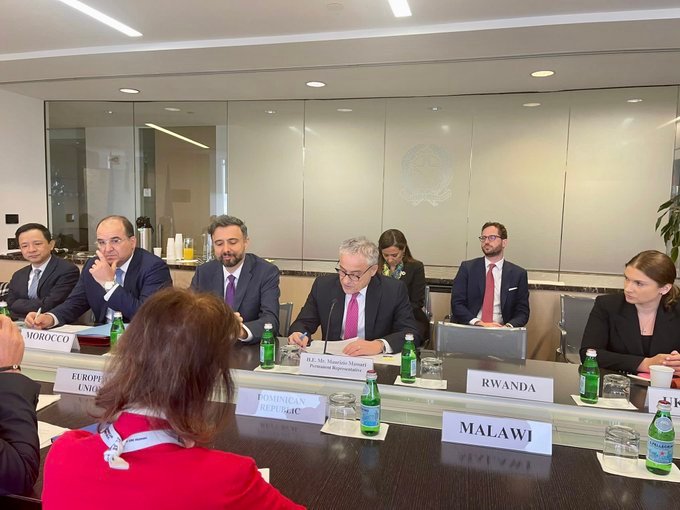NEW YORK/WASHINGTON, APRIL 27 – Briefing UN delegates on financing transformation of the Food Systems, the IFAD President Alvaro Lario called upon Member States to step up their pledges and invest in a resilient future for all. The 4th major donor to the Rome-based agency, Italy hosted the briefing at its Mission, in line with its commitment to boost progress on SDG2 in the run-up to the Stocktaking Moment of the Food Systems Summit which will take place in Rome in July and then to the Sdg Summit next September in New York.
Coming from the G7 Agriculture Ministers’ Meeting in Miyazaki, Japan, Lario was yesterday in Washington DC to meet with members of Congress and their staff, then moved on to New York to participate in the Global Citizen NOW event.
IFAD is the UN’s only specialized agency exclusively focused on rural development and boosting rural economies. “The populations we serve, who produce so much of our food, are not looking for hand-outs,” said Lario. “They are seeking to overcome limits such as lack of access to finance, technology and connectivity. They deserve our support.” He remarked that about 3 billion people live in the rural areas of developing countries and rely to a significant extent on small-scale farming for their food and livelihoods. “Rural economies and specifically agriculture have suffered from chronic under-investment in recent decades. Continuing to neglect rural people will increase poverty, hunger, migration, and make conflict and instability more likely. Food and income security are essential for national security.”
Today’s food crisis results from the convergence of multiple crises including climate extremes, conflicts, economic shocks and food supply chain disruptions, many linked to the war in Ukraine and the global pandemic. Food and fuel prices globally were at record high levels by the end of 2022, and though commodity prices have now come down in international markets, food prices have remained high in developing countries which depend greatly on imported food and currency strength against the US dollar. “We urgently need to increase investment in rural areas of developing countries to safeguard global food security and ultimately, national security,” said Lario.
Investing in rural areas and small-scale farmers can lift millions out of poverty and hunger. Investments in agriculture are effective in reducing both hunger and poverty. GDP generated by agriculture, for example, is 2 to 3 times more effective in reducing poverty than growth in any other sector. Alarming debt levels in low and middle-income countries, global inflation and local currency depreciation make it extremely challenging for developing countries to finance longer-term development.
IFAD launched its 13th replenishment in February 2023, calling for increased investments in small-scale, rural farmers across developing countries. Small-scale farmers produce one third of the world’s food and up to 70% of the food produced in low- and middle-income countries. They are key to global food security, but also stability as hunger and poverty can fuel migration and conflict.
Donor support to agriculture has been stagnant at 4 to 6 % of Official Development Assistance for at least two decades. Small-scale farmers receive less than 2 % of global climate finance. (@OnuItalia)

